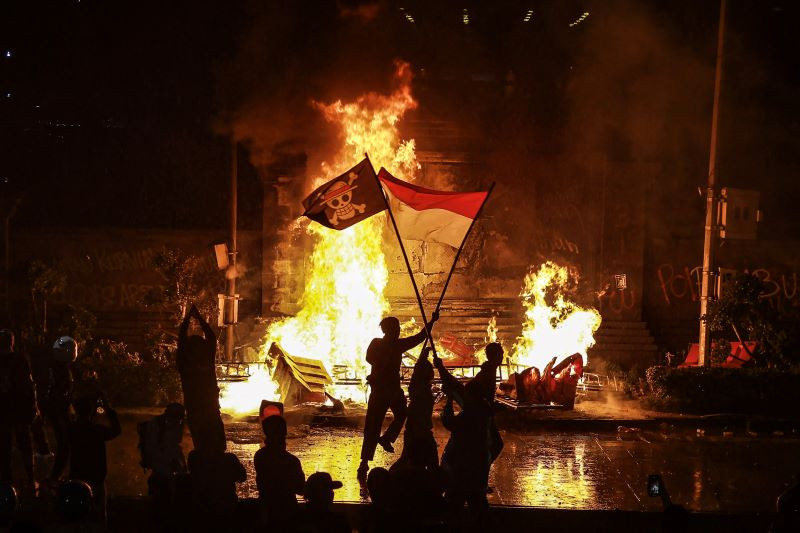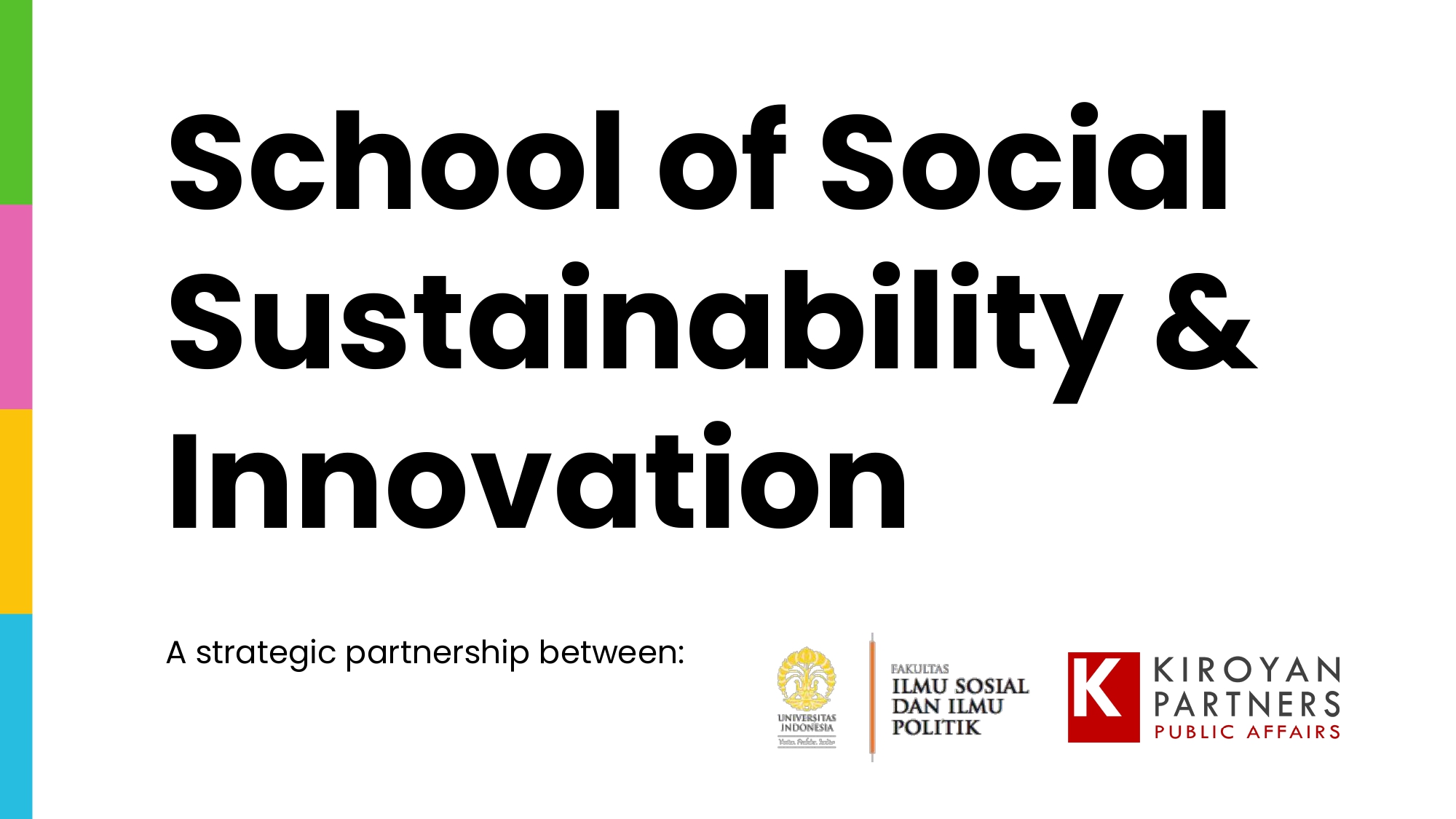The new police reform efforts underway since the August-September protests must clearly delineate the steps toward rebuilding a civilian policing institution, in particular redefining the role and functions of the National Police’s paramilitary Brimob unit.

Protestors wave the Red and White flag and the Straw Hat Pirates flag from Japanese manga ‘One Piece’ on Aug. 29, 2025, during a rally outside the Jakarta Metropolitan Police headquarters on Jl. Sudirman. (Antara/Dhemas Reviyanto)
The death of an online motorcycle taxi driver, crushed by a tactical vehicle of the police Mobile Brigade (Brimob) during protests in Jakarta on Aug. 28, ignited a firestorm. Within days, demonstrations erupted in more than 30 cities and thousands took to the streets. Nine more lives were lost, including in clashes with security forces.
Public grief turned to rage and civil society groups demanded not just justice, but a fundamental rethinking of how Indonesia is policed. The National Conscience Movement (GNB), a broad interfaith and civil society coalition, met President Prabowo Subianto on Sept. 11 to deliver that message.
In response, the President announced a police reform effort and appointed retired police general Ahmad Dofiri as a special adviser on public order and police reform. It was a rare acknowledgment that policing had lost public trust.
But just as momentum gathered, the National Police chief announced his own reform transitional team, an internal task force made up entirely of police officers. Civil society critics warned the initiative risked becoming a closed-door exercise, protecting institutional interests rather than transforming them.
At the heart of this reform lies the paradox. The police have a constitutional mandate to secure society, distinct from the defense role of the Indonesian Military (TNI) and firmly within the civilian domain. Yet when Brimob, the paramilitary backbone of the National Police, is deployed to suppress protests or guard plantations and mines with national vital object (Obvitnas) status, it raises a troubling question: Whose security is being protected, that of the public or of a privileged few?
The separation of the police from the military, as part of the 1998 reform agenda, was designed to clarify roles and reinforce civilian supremacy. The TNI was tasked with external defense, the police with internal security. This was meant to transform the National Police from a militarized arm into a civilian law enforcement agency.
Yet 27 years later, public trust is eroded not just by crackdowns on protests but also by a perception that Brimob and other policy units act as security contractors for powerful interests.
In Ketapang, West Kalimantan, for instance, Brimob personnel stationed to guard oil palm plantations amid land disputes were accused of intimidating villagers and shooting at protestors. In Murung Raya, Central Kalimantan, Brimob personnel were deployed to secure a gold mine, triggering clashes with local residents.
When Brimob is seen as protecting oligarchic assets rather than the rights of citizens, its neutrality is called into question. This undermines public confidence and blurs the constitutional distinction between defense and security, turning a civilian mandate into something closer to only protecting the few, with force.
Brimob today is vast: a corps-sized force of more than 50,000, equipped with military-grade weapons and commanded by a three-star general. It performs riot control, counterterrorism, bomb disposal and even counterinsurgency operations in Papua, often with TNI augmentation. For these assignments, its officers must undergo rigorous and specialized training to expertly manage situations that exceed the capabilities of regular patrol officers.
It is crucial that Brimob’s mission remains firmly aligned with the police force’s core mandate, namely to serve and protect citizens within our borders with unwavering dedication to law enforcement operations. Their responsibilities should never extend to warfare or combat operations, nor should they be reduced to merely providing security for private entities.
By steadfastly adhering to these principles, Brimob can effectively fulfill its essential role in ensuring the safety and security of the community. As with its current practice as security guards, local residents often testify that such deployments escalate tensions rather than resolve them.
When a force meant to embody civilian policing adopts military posture and corporate alignment, the result is a legitimacy crisis. The question becomes not whether the National Police can maintain order, but whether it can do so while remaining an impartial guardian of public security.
On the other hand, the police leadership has promoted a vision intended to bolster professionalism dubbed “Presisi”, short for Predictive, Responsibility, Transparency with Justice, and has emphasized scientific crime investigation as a marker of modernization.
These are important steps, but modernization cannot stop at forensics and predictive policing tools. Instead, it must extend to defining whom the police ultimately serve.
Presisi will only be credible if it governs Brimob deployments, ensuring data-driven accountability for use of force, publishing annual statistics on Obvitnas security operations and aligning doctrine with human rights standards. Modern policing is not just technologically sophisticated; it is socially legitimate.
One glaring omission in police reform over the years in Indonesia’s governance is its direct reporting line to the president, without any ministerial intermediary. This arrangement, combined with the institution’s scale, command structure and strategic facility security functions, means the National Police risks becoming an unaccountable “super-body”.
The new police reform agenda must close the gap between constitutional promise and public perception.
First, civilianize Brimob. Redefine its mandate, separate riot control from counterterror and counterinsurgency roles, embed human rights-based doctrine across all functions and rotate personnel out of conflict zones to prevent militarized culture from spreading.
Second, place legal limits on corporate security. Brimob can no longer act as private security for plantations, mines or strategic projects except under transparent, publicly disclosed arrangements with clear accountability.
Third is transparency and oversight. Require regular public reporting on budgets, operations and use-of-force incidents, with independent oversight by the National Commission on Human Rights and the House of Representatives.
Fourth, establish neutrality mechanisms. Create grievance and mediation systems for communities in conflict with companies to ensure impartial policing.
Fifth, embed Presisi beyond forensics. Apply its principles to public order management and corporate security engagements, with a strict code of ethics and rights-based training.
Only with these steps can the National Police regain its reputation as a true civilian guardian of security rather than militarized defender of the oligarchy. It can then embark on its core services as a credible law enforcement agency, with an emphasis on local-level community policing.
A reimagined police force, one that is civilian, neutral, transparent and trusted, would not only restore public confidence but stand as a model of democratic policing in Southeast Asia.*
Herbin M. Siahaan is a senior legal consultant and former project manager at the International Criminal Police Organization (Interpol). Adi Abidin is a public policy expert at Kiroyan Partners. The views expressed are personal.
Source: The Jakarta Post, October 3, 2025.
Download the clipping here.



